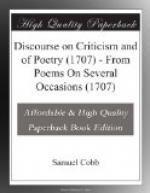Bocalin, the Italian Wit, among his other odd Advertisements, has this remarkable one, which is parallel to the present Discourse. When Tasso (says he) had presented Apollo with his Poem, call’d Giurasalemme Liberata; the Reformer of the Delphic Library, to whose Perusal it was committed, found fault with it, because it was not written according to the Rules of Aristotle; which affront being complain’d of, Apollo was highly incens’d, and chid Aristotle for his Presumption in daring to prescribe Laws and Rules to the high Conceptions of the Virtuosi, whose Liberty of Writing and Inventing, enrich’d the Schools and Libraries with gallant Composures; and to enslave the Wits of Learned Men, was to rob the World of those alluring Charms which daily flow’d from the Productions of Poets, who follow the Dint of their own unbounded Imagination. You will find the rest in the 28th Advertisement.
The Moral is instructive; because to judge well and candidly, we must wean our selves from a slavish Bigotry to the Ancients. For, tho’ Homer and Virgil, Pindar and Horace be laid before us as Examples of exquisite Writing in the Heroic and Lyric Kind, yet, either thro’ the Distance of Time, or Diversity of Customs, we can no more expect to find like Capacities, than like Complexions. Let a Man follow the Talent that Nature has furnish’d him with, and his own Observation has improv’d, we may hope to see Inventions in all Arts, which may dispute Superiority with the best of the Athenian and Roman Excellencies.
Nec minimum meruere decus vestigia Graeca
Ausi deserere.——
It is another Rule of the same Gentleman, that we should attempt nothing beyond our Strength: There are some modern Milo’s who have been wedg’d in that Timber which they strove to rend. Some have fail’d in the Lyric Way who have been excellent in the Dramatic. And, Sir, would you not think a Physician would gain more Profit and Reputation by Hippocrates and Galen well-studied, than by Homer and Virgil ill-copied?




